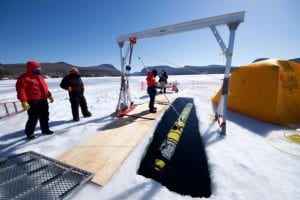WHOI in the News
How to Talk to Kids About Climate Change
Luckily, there are a lot of experts who are parents themselves who can help. Here are some of their tips.
With A Drone and Patience, Scientists Track Endangered Right Whale in Cape Cod Bay
The whales are nearing the end of a three-month period during which nearly half the population of approximately 360 can be spotted in Cape Cod Bay.
If there is an oil spill tomorrow, will we be ready? Woods Hole engineer says yes
WHOI worked with the U.S. Coast Guard on Thursday on how deploying the robot would work and to test retrieving it with a helicopter.
Rising Tide Exhibition at Museum of the City of New York Illustrates the Dramatic Consequences of the Climate Crisis
As climate change continues to make headlines, Rising Tide: Visualizing the Human Costs of the Climate Crisis, a new exhibition at Museum of the City of New York, features works by Dutch photographer Kadir van Lohuizen that illustrate the dramatic effects of rising sea levels.
Cape Cod Climate Research Station Abandoned Because It’s About to Fall Into the Sea
Japan to release contaminated Fukushima water into sea after treatment
The first release of water will take place in about two years, giving plant operator Tokyo Electric Power time to begin filtering the water to remove harmful isotopes, build infrastructure and acquire regulatory approval.
Research Project Looks to Determine the DNA of Aquaculture
After assembling a team of researchers at Southern Connecticut State, Mr. Heitkamp sent the Martino brothers two probes that are currently floating on a two-acre parcel of ocean next to their farm.
Got wrap? Initiative wants to recycle boat covers
“This gives boat owners a place to drop off their plastic shrink wrap so it can be properly recycled,” said Sean Steinberg, Seaside Sustainability’s project manager for the initiative. “They can’t recycle it through regular curbside recycling and too often it ends up in landfills, where it’s burned. This is a much safer and more sustainable way.”
The Most Fascinating Facts About the Titanic
April 15 will mark the 109th anniversary of the sinking of the Titanic, which claimed the lives of more than 1,500 people. It was among the worst maritime disasters in history.
Why Are Scientists Studying Coral’s Smell?
All living things release volatile chemicals, and many species have adopted specific volatiles as communicative signals. Scientists have long studied their function in terrestrial organisms.
Ropeless fishing tech could help save rare whale, say scientists
Virtual buoys and time triggered traps reduce risk to endangered North Atlantic right whale, but reactions among fishers in US and Canada are mixed.
Endangered North Atlantic Right Whales Experience Highest Birth Rate Since 2015
Endangered North Atlantic right whales gave birth in greater numbers this winter compared to the past six years — a promising sign for a species that’s been driven to the brink of extinction due to human activity.
Ancient atmospheric oxygen sleuthing with ocean chromium
Currently, geoscientists and paleoceanographers from MIT and the Woods Hole Oceanographic Institution (WHOI) are looking to add another use to that list: as a way to examine chemical shifts in ancient Earth’s oceans and atmosphere that are preserved in the seafloor’s paleorecord.
Alvin Pilot Is Guest Speaker For Supper Club Series
Warmer World Needs More Protected Habitat
With climate change soon to be the main threat to biodiversity, protected habitat will be a higher priority than ever to give wildlife a chance.
Deep-sea exploration breakthrough to guide future space exploration missions
The ASU researchers exploring deep sea hydrothermal vents as part of the SUBSEA project moved their modeling to the beginning of this process, significantly speeding up their ability to interpret the data from months to a couple of hours.
Cape Cod Researchers To Test New Camera That Could Protect Right Whales From Ships
The technology is a miniaturized version of a system originally designed to protect whales from underwater noises.
Arctic scientists test underwater drone on Willoughby Lake
New England winters can often feel as cold as the Arctic. But for researchers from WHOI’s Applied Ocean Physics & Engineering department, Vermont’s polar-like cold proved to be the perfect testing site for Remus 600. The state’s deepest lake – Lake Willoughby – offered fewer risks than the Arctic Ocean, while providing important data about ice measurement and water temperature, helping to streamline the real mission this fall.
We’ve Known For Years Global Warming Could Lead To A New Ice Age. Why Is No One Doing Anything?
The possibility that climate change could flip and, in just a matter of years, plunge part of the world into a new ice age is something that has occasionally made its way into the media.
Slowdown of powerful current system could negatively impact climate patterns, study says
A new study says the powerful system of currents that are the flywheel of Earth’s climate might be weakening. WHOI president and director Peter de Menocal joined Elaine Quijano on CBSN with details.
The Broadcast with Jane Adey
The ocean is a part of daily life in Newfoundland and Labrador. Whether it’s fishing, tourism, shipping, research or culture, there are thousands of people whose lives have some connection to the sea. The Broadcast casts a wide net to explore the stories of people in coastal communities in Newfoundland and Labrador and around the world.
Climate change can destabilize the global soil carbon reservoir, new study finds
“The study results indicate that at the large ecosystem scale of river basins, soil carbon is sensitive to climate variability.”
WHOI Study Finds Offshore Pile Driving Noise Alters Feeding Behaviors of Longfin Squid
Study Finds That Offshore Pile Driving Noise Alters Feeding Behaviors Of Longfin Squid
With the offshore wind industry expanding in the United States and elsewhere, a new study raises questions about how the noise from impact pile driving to install turbine supports can affect feeding behaviors of longfin squid, a commercially and ecologically important cephalopod.


